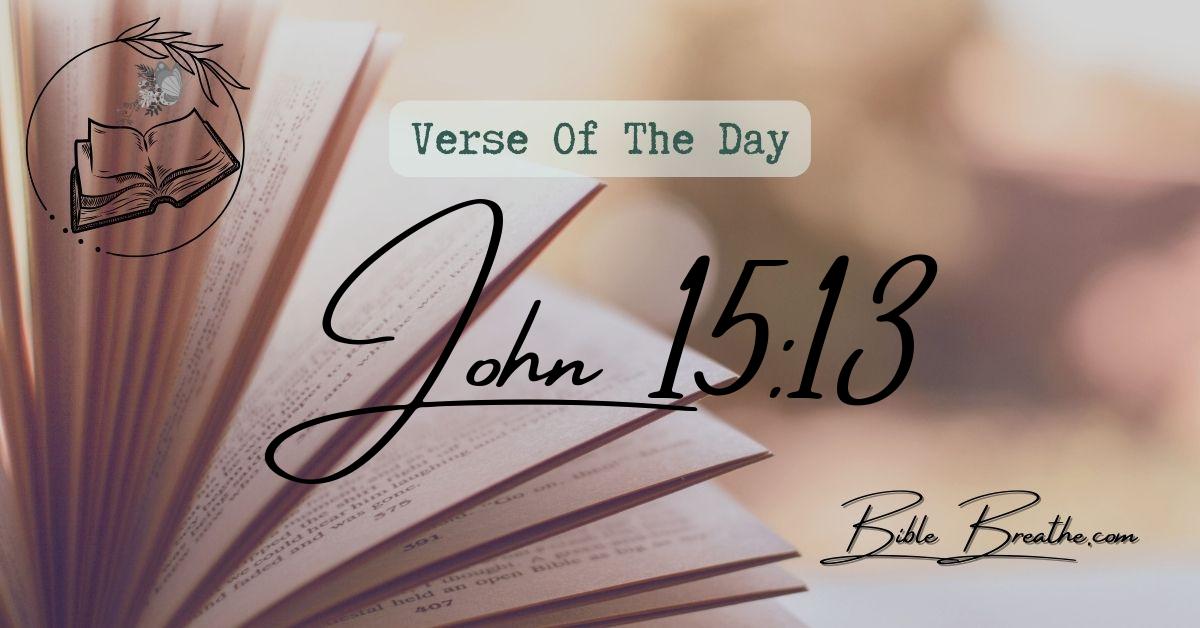John 15:13—this verse hits different, doesn’t it?
It’s like the mic-drop moment in the book of John, where Jesus lays down the real deal about love.
Picture this: you’re flipping through the pages of John, soaking up all the epic stories and wisdom from Jesus, and then boom!
He drops this truth bomb about the ultimate love.
So, Jesus says, “No one has greater love than this: to lay down one’s life for their friends.” Whew!
That’s like love on steroids, right?
Think about it—putting your life on the line for your squad, your pals, your people.
That’s some serious sacrificial friendship!
But here’s the kicker: Jesus ain’t just talking the talk here; He’s walking it.
He’s showing us what true love’s measure looks like through His own life.
He straight-up lived this verse, giving everything for us.
That’s how much Christ’s love exemplified true sacrificial love.
Join me in unpacking this powerful verse, diving deep into the greatest form of love, where selflessness takes center stage.
We’re exploring what it means to lay it all down for others and how Jesus set the bar high for genuine, sacrificial friendship.
Let’s dig in, fam!
Key Takeaways
- John 15:13 lays out the gold standard of love: sacrificing oneself for another. It’s the ultimate display of Christ’s love exemplified, where Jesus Himself put this principle into action by laying down His life for us.
- This verse isn’t just poetic; it’s profound. In defining the greatest form of love, it challenges our understanding and sets the bar high for genuine, sacrificial friendship.
- In a world that often promotes self-first, embracing the essence of John 15:13 means prioritizing others, making sacrifices in our relationships, and going the extra mile without expecting anything in return.
- Whether it’s a friend in need, a neighbor facing adversity, or a stranger seeking comfort, embodying this verse is about stepping up and showcasing a love that’s willing to lay down time, resources, and sometimes even personal desires for the betterment of another.
- In our journey of faith, understanding and internalizing this verse pushes us beyond just being hearers of the Word to becoming doers, modeling the very essence of Christ-like love in our everyday interactions.
John 15:13: Sacrificial Love Defined
In this verse, Jesus shares a profound truth about love that resonates across time and space.
He emphasizes the greatest form of love, showcasing a sacrificial friendship that surpasses all other expressions of affection.
Jesus speaks these words, underscoring the magnitude of selflessness and sacrifice in true love’s measure.
Verse of the Day:
“Greater love hath no man than this, that a man lay down his life for his friends.” – John 15:13, KJV
Basic facts of the verse:
| **Attribute** | **Value** |
|---|---|
| Book | Gospel of John |
| Chapter | 15 |
| Verse | 13 |
| Christian Bible part | New Testament |
| KEYWORDs | Love, lay down one’s life, friends |
| Topics | Sacrificial love, Friendship |
| Bible Themes | Love exemplified, Sacrifice |
| People | Jesus, Man |
| Location | Not specified |
This verse encapsulates the essence of Christ’s love exemplified by His willingness to lay down His life for humanity, demonstrating the highest form of sacrificial love, paving the way for an enduring legacy of divine affection and selflessness.
John 15:13 KJV Cross References
These are some Bible verses related to John 15:13:
| **Cross Reference Verse (KJV)** | **Verse** |
|---|---|
| Romans 5:7 | For scarcely for a righteous man will one die: yet peradventure for a good man some would even dare to die. |
| 1 John 3:16 | Hereby perceive we the love of God, because he laid down his life for us: and we ought to lay down our lives for the brethren. |
| Ephesians 5:2 | And walk in love, as Christ also hath loved us, and hath given himself for us an offering and a sacrifice to God for a sweetsmelling savour. |
| 1 John 4:10 | Herein is love, not that we loved God, but that he loved us, and sent his Son to be the propitiation for our sins. |
| Romans 8:35 | Who shall separate us from the love of Christ? shall tribulation, or distress, or persecution, or famine, or nakedness, or peril, or sword? |
| Galatians 2:20 | I am crucified with Christ: nevertheless, I live; yet not I, but Christ liveth in me: and the life which I now live in the flesh, I live by the faith of the Son of God, who loved me, and gave himself for me. |
| 1 John 2:3-6 | And hereby we do know that we know him if we keep his commandments. He that saith, “I know him” and keepeth not his commandments is a liar, and the truth is not in him. But whoso keepeth his word, in him verily is the love of God perfected: hereby know we that we are in him. He that saith he abideth in him ought himself also so to walk, even as he walked. |
| Colossians 3:14 | And above all these things put on charity, which is the bond of perfectness. |
| Galatians 5:22-23 | But the fruit of the Spirit is love, joy, peace, longsuffering, gentleness, goodness, faith, meekness, temperance: against such there is no law. |
Historical and Cultural Context

Photo modified by BibleBreathe.com. Original photo by Suliman Sallehi on Pexels
Step back with me to the Roman-ruled city of Jerusalem, around the 1st century AD.
The streets were abuzz with talk of a radical rabbi named Jesus.
The city was a melting pot of cultures, beliefs, and practices, where love was often traded for power and alliances.
In that society, where the Roman Empire was the very definition of worldly power, the idea of laying down one’s life for a friend would seem preposterous.
Valor was seen in dominance, not in sacrifice.
Now, picture Jesus, standing against this backdrop, speaking the profound words, “Greater love has no one than this: to lay down one’s life for one’s friends” (John 15:13).
It was a paradigm-shifting perspective on what constitutes the greatest form of love.
In a world where friendships often were politically or financially motivated, Jesus introduced a different kind of bond – sacrificial friendship.
It wasn’t about what you could get, but what you could give, even if it meant giving up everything.
This went against every societal norm of the day.
Historically, in various cultures, the act of self-sacrifice was reserved for the highest honors or gods.
By defining this as the epitome of love, Jesus not only set a new standard but also foreshadowed His ultimate act of love on the cross – a Christ’s love exemplified.
To the ancient audience, this verse presented a challenging question: Are we willing to let go of societal definitions and embrace the true measure of love?
Even today, in a world that often equates love with feelings or fleeting emotions, Jesus calls us to a deeper, selfless, transformative love.
Do we get it?
And more importantly, are we living it?
Verse Analysis and Literal Interpretation
John 15:13 reads, “Greater love has no one than this, to lay down one’s life for one’s friends.” Let’s peel back the layers, word by word, diving deep into this ocean of sacrificial love.
- “Greater love”:
- Greater: Not just an adjective. It’s a superlative, signifying the zenith, the pinnacle. It makes you wonder, is there truly a greatest form of love?
- love: In the original Greek, it’s “ἀγάπη” (agape), an unconditional love, often ascribed to God’s nature. This isn’t just any love; it’s divine, transcending human understanding.
- “has no one than this”:
- This phrase sets the bar. It’s the standard by which all other forms of love are measured. It’s the litmus test for true love’s measure.
- “to lay down one’s life”:
- This isn’t about a mere act of physical sacrifice. It’s the utmost sign of devotion, the epitome of laying down one’s life. It’s the essence of sacrificial friendship.
- “for one’s friends”:
- Friends aren’t just casual acquaintances here. Consider the depth of bond, of trust, and shared history. Imagine the weight of love that’s encapsulated in this term.
Contextually, this verse is nestled in Jesus’ discourse on Him being the true vine.
The chapter emphasizes abiding in His love, keeping His commandments, and the joy of being in Him.
As Jesus speaks these words, He’s foreshadowing His imminent crucifixion—a practical embodiment of Christ’s love exemplified.
Reflect on this: How often do we encounter stories of people risking it all for others?
Soldiers, firefighters, or even a stranger on the street.
Isn’t that a beautiful echo of Christ’s words, a manifestation of love in its purest form?
How are you living out this profound love in your everyday life?
Comparative and Literary Analysis: John 15:13
Navigating the pathways of love’s maze, you’ll often find signposts pointing you to John 15:13: “Greater love has no one than this: to lay down one’s life for one’s friends.” But what if we’ve walked these pathways before?
What if the heartbeats of other religions pulse with similar rhythms?
Similarities with other religious texts
- Qur’an (Surah Al-Furqan 25:63): Emphasizes humility and gentleness, which echoes the idea of sacrificial friendship.
- Bhagavad Gita (2.47): Lord Krishna teaches about selfless action, resonating with the greatest form of love where one’s deeds are done without expecting rewards.
- Guru Granth Sahib (Page 1375): It speaks of selfless love and devotion, a sentiment reflecting the sacrificial friendship found in John 15:13.
- Buddhist Jataka Tales: Many stories depict the Buddha making sacrifices for others, resonating with the laying down one’s life for friends theme.
Differences with other religious texts
- Explicit Sacrifice for Friends: John 15:13 uniquely underscores the sacrificial friendship where one willingly lays down their life specifically for friends.
- Christ’s Exemplification: This verse foreshadows Jesus’ crucifixion, where Christ’s love is exemplified through his ultimate sacrifice, an event central to Christianity.
- Definition of ‘Greatest Love’: While many scriptures discuss love, John 15:13 concretely defines the greatest form of love as laying down one’s life for friends, a specific measure not always echoed elsewhere.
Here’s a thought – Ever seen kids trading Pokémon cards, often sacrificing their rarest for their friends?
In a world riddled with fleeting emotions, the true measure of love has been eternally etched in John 15:13.
Whether you’re trading cards or moments, what are you willing to lay down for a friend?
Theological Insights and Interpretations: John 15:13
Picture this: A friend pushes you out of the way of a speeding car, risking their own life for yours.
That’s John 15:13 in action – “Greater love has no one than this: to lay down one’s life for one’s friends.” It’s the greatest form of love we can fathom.
But does every Christian denomination see it the same way?
How different religious groups interpret the verse:
- Roman Catholicism: Through the lens of the Eucharist, it symbolizes Christ’s supreme sacrifice and the calling for believers to emulate this sacrificial friendship.
- Eastern Orthodox: Emphasizing the mystic union with Christ, this verse reflects how believers must engage in selfless acts to mirror Christ’s love.
- Protestantism: The verse underscores the doctrine of atonement, where Jesus exemplified the greatest form of love by dying for humanity’s sins.
- Seventh-day Adventists: Highlighting the second coming, they regard the verse as a call to be ready to sacrifice for faith, paralleling Jesus’s sacrifice.
- Mormonism: While recognizing Christ’s sacrifice, it also emphasizes the human role in showing love through selfless acts, approaching the true love’s measure.
- Jehovah’s Witnesses: For them, Jesus’s act of laying down one’s life is a model for the faithful, emphasizing dedication to God and the community.
In the broader biblical narrative, this verse serves as the crux of Jesus’s teachings on love.
It challenges every believer, asking, “How deep is your love?”
Modern debates, though, circle around its practicality.
In a self-centric age, what does it mean to lay down one’s life?
Is it about monumental sacrifices or daily acts of love?
Can swiping right ever compare to the depth of Christ’s love exemplified?
As you ponder, remember this: Love isn’t just about feeling.
It’s about action.
So, how will you measure your love today?
The Nexus of John 15:13 and Science: The Depth of Love’s Quantum Leap

Photo modified by BibleBreathe.com. Original photo by Pixabay on Pexels
Have you ever pondered about the gravitational pull of love?
John 15:13 boldly declares, “Greater love has no one than this: to lay down one’s life for one’s friends.” In a world illuminated by neon lights of scientific discovery, how does this verse, emphasizing the greatest form of love, resonate with the sterile corridors of labs and research?
How the verse aligns or contrasts with current scientific understanding:
Science has delved deep into the anatomy of the human heart, examining neurons, chemicals, and synapses.
Yet, the profound act of laying down one’s life — can that truly be quantified by electrodes and brain scans?
The oxytocin surge in moments of love and bonding is well-documented.
But can it measure up to the sacrificial friendship and the lengths one might go for love?
Picture this: a mother, faced with danger, instinctively shields her child.
It’s a biological response, yes, but doesn’t it echo the true love’s measure as well?
Yet, when we zoom into Christ’s love exemplified, we’re grappling with a love so intense, so vast, it feels otherworldly.
Science, with its emphasis on evidence, might struggle to categorize such a love.
It’s like trying to describe colors to someone who only sees in black and white.
Let’s lean into a modern-day scenario.
Say, you’re donating an organ to save a friend.
The medical procedure, the anesthetics, the recovery – all this is within science’s domain.
But the decision, the motivation rooted in sacrificial friendship — isn’t that a realm where John 15:13 casts its profound shadow?
A rhetorical tease for your neurons: If love were an equation, could it be possibly solved?
Or is it the divine variable that adds the unpredictable, yet delightful twist in the cosmic dance of life?
John 15:13: Love’s Ultimate Blueprint
Picture yourself standing at the edge of a cliff, the wind howling, the abyss beckoning.
Beside you stands a dear friend, willing to leap into the unknown, just to save you.
This is the essence of John 15:13, which proclaims, “Greater love has no one than this: to lay down one’s life for one’s friends.”
But how do we translate this greatest form of love into our daily walk?
Practical Application of John 15:13
In a world where love is often reduced to fleeting emotions or Instagram captions, this verse challenges us to a deeper, more sacrificial understanding.
The sacrificial friendship Jesus speaks of isn’t just about physical death; it’s about daily choices, priorities, and sacrifices.
So, how do we embody this love in our everyday decisions?
- Redefine Sacrifice: Understand that laying down one’s life isn’t always about grand gestures. It could be as simple as sacrificing your time, comfort, or resources for someone else. Before making decisions, ask: Is this choice rooted in self-love or sacrificial love?
- Embrace Christ’s Love Exemplified: Jesus is the ultimate example of this love. Reflect on His sacrifices, not just on the cross but in His daily interactions. When faced with choices, think: What would Jesus do in this situation?
- Evaluate Relationships: The verse speaks of laying down one’s life for “friends.” Evaluate your relationships. Are they surface-level, or do they reflect the depth and sacrifice of true love’s measure? Make decisions that deepen and strengthen these bonds.
- Daily Acts of Love: Make it a point to perform daily acts of sacrificial love. It could be as simple as listening to someone, helping a neighbor, or giving up something you love for someone else’s benefit.
- Seek Guidance in Love’s Blueprint: Before any decision, big or small, consult the ultimate blueprint of love – John 15:13. Let it guide your choices, ensuring they reflect love’s true essence.
In conclusion, as we traverse life’s winding paths, may we always be guided by the North Star of sacrificial love.
In a world that often misunderstands love’s true essence, isn’t it time we showcased its depth, breadth, and height?
After all, if love is the answer, shouldn’t we ensure we’re asking the right questions, rooted in the profound wisdom of John 15:13?
John 15:13: Exploring the Depths of Love’s Ultimate Sacrifice

Photo modified by BibleBreathe.com. Original photo by SHVETS production on Pexels
Let’s visualize for a moment, a scale of love, with everyday affections on one side and the weightiest, deepest expressions on the other.
Where on that scale would you find the act of giving up one’s life for a friend?
John 15:13 doesn’t just describe love; it defines its pinnacle, setting the bar at a celestial height.
Exegetical Questions and Critical Thinking for Engagement:
As we prepare to delve deep, I beckon you to the still waters of introspection, where the ripples of John 15:13 can truly be felt and understood.
- Reflecting on the “Greatest form of love”, what examples from your life or history mirror this profound level of sacrifice?
- The phrase “Laying down one’s life” is intense and powerful. But does it always mean physical death? Are there other forms of sacrifices that capture the essence of this verse?
- What real-life scenarios come to mind when you think of “Sacrificial friendship”? How does this reshape our understanding of friendship’s depth?
- “Christ’s love exemplified” – How does Jesus embody this scripture, and how can we mirror it in our daily lives?
Now, let’s blend this spiritual wisdom with everyday experiences:
- You’re faced with a choice: A lucrative career move overseas or staying back to support a friend battling illness. How does John 15:13 illuminate your path?
- A close friend unintentionally wrongs you, leading to public embarrassment. Guided by the essence of “True love’s measure”, how would you respond?
- During a group discussion, the topic veers to defining ‘true love’. With John 15:13 as your foundation, how would you elucidate love’s highest form?
Interweaving the verse with current events:
- News Flash: “Local firefighter risks life to save child from blazing inferno.” Isn’t this a manifestation of John 15:13, demonstrating love beyond bounds?
- Breaking News: “Anonymous donor funds entire medical treatment for terminally ill stranger.” In the light of the verse, can we see this act as a metaphorical ‘laying down of life’ for another?
John 15:13 challenges us, not just to understand love but to live it – in its purest, most sacrificial form.
In a world where love is often diluted and fleeting, may we continually be inspired to reflect its true essence, where selflessness reigns supreme.
Frequently Asked Questions (FAQs) About John 15:13
What is the significance of the sacrificial love mentioned in John 15:13?
John 15:13 declares that the greatest form of love is to lay down one’s life for friends.
This statement captures the sacrificial nature of Jesus’ love, highlighting His willingness to give His life for the salvation of humanity.
It serves as a powerful example for believers, inspiring selfless and sacrificial love within Christian relationships.
How can believers apply the concept of laying down their lives for their friends, as stated in John 15:13?
Applying the concept of laying down their lives for friends involves sacrificial love and selflessness.
This includes prioritizing others’ well-being, actively serving, and demonstrating Christ-like love.
Being willing to make personal sacrifices, whether in time, resources, or comfort, reflects the profound love exemplified by Jesus, as stated in John 15:13.
Are there other Bible verses that reinforce the theme of selfless love, similar to John 15:13?
John 15:13 declares the greatest love as laying down one’s life.
Reinforcing verses include 1 Corinthians 13:3, emphasizing love’s significance, and Ephesians 5:2, urging believers to walk in love.
These verses collectively emphasize the sacrificial and selfless nature of love as exemplified by Christ.
In what ways does John 15:13 shape our understanding of the depth of Christ’s love and our call to love others?
John 15:13 declares that the greatest love is laying down one’s life for others.
This shapes our understanding of Christ’s love as sacrificial and calls believers to emulate this selfless love.
It challenges us to love others deeply, even at personal cost, reflecting the transformative power of Christ’s love in our relationships.
Can you provide insights into the cultural and historical context influencing the message of John 15:13?
In the cultural and historical context of John 15:13, Jesus speaks to disciples familiar with sacrificial love.
The Roman world valued loyalty and friendship, often depicted through self-sacrifice.
Jesus elevates this cultural concept, presenting the ultimate sacrifice—laying down one’s life for friends.
This challenges and transforms the disciples’ understanding of love, emphasizing its sacrificial and selfless nature.
Matt Turner
I’m Matt, and I love breaking down Bible verses in a way that’s easy to understand and apply to everyday life. My goal is to help you connect with God’s Word and find practical ways to live it out. Whether you’re new to the Bible or just looking for some fresh insights, I’m here to walk with you and share what I’ve learned along the way.

